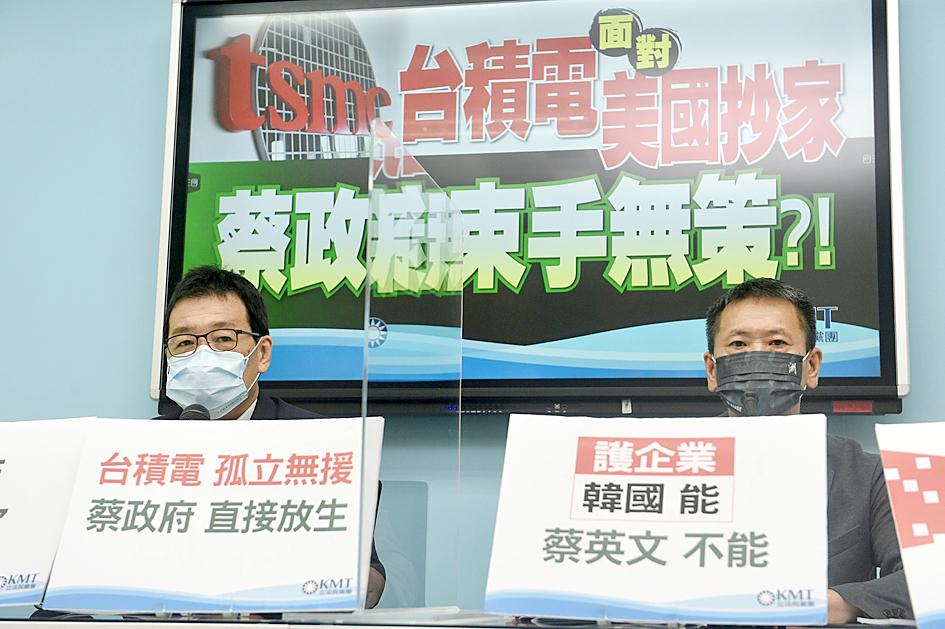The Chinese Nationalist Party (KMT) caucus yesterday accused President Tsai Ing-wen (蔡英文) of caving in to the US’ demand that Taiwan Semiconductor Manufacturing Co (TSMC) hand over confidential information.
The US Department of Commerce on Sept. 23 asked US and foreign semiconductor companies, including TSMC and South Korea’s Samsung Electronics Co, to provide information on chip inventory and sales within the next 45 days, media reports said.
US President Joe Biden’s administration is considering invoking the Defense Production Act to force companies to provide the information, the reports said.

Photo: George Tsorng, Taipei Times
US Secretary of Commerce Gina Raimondo was cited by Reuters as saying that the request for information on the chip crisis would strengthen supply chain transparency and that “other tools” would be brought to bear on companies that did not comply.
The Tsai administration and Minister of Economic Affairs Wang Mei-hua (王美花) are willing to sacrifice TSMC’s interests to comply with the US’ wishes, the KMT caucus told a news conference in Taipei.
Urging the Ministry of Foreign Affairs and the Ministry of Economic Affairs to lodge a protest with Washington, the caucus said it is prepared to bring its case to the Legislative Yuan.
The government should get tough with the US, as Washington’s actions contravene Article 2 of the Trade Secrets Act (營業秘密法), KMT Legislator William Tseng (曾銘宗) said.
“The government has to protect the Republic of China’s economic interests and those of TSMC’s 950,000 shareholders,” Tseng said.
Tsai should consider demanding that Intel also provide confidential information about its inventory if the US insists on demanding the same from TSMC, he said.
The US has repeatedly used the Sherman Antitrust Act and other legal mechanisms to force foreign industries to surrender trade secrets or technologies since the 1980s, KMT caucus whip Alex Fai (費鴻泰) said.
The use of such methods led to the downfall of Japanese companies Toshiba and Hitachi, he added.
Should TSMC give up confidential information about its manufacturing process, orders and inventory, it could lose its competitive edge, and its ability to act as the “sacred mountain guarding the nation,” he said.
Tsai is lying to the country about how Washington’s request would not hurt the chipmaker, Fai said, adding that the government would surely have rejected the request had it come from Beijing.
Tsai should not have prostrated the nation before the US or be indifferent to its unreasonable demands, he added.
“This shows that Tsai, Wang and the Democratic Progressive Party are cowards,” Fai said.
KMT Legislator Lin Wei-chou (林為洲) said that South Korea has reacted promptly by creating a committee with its semiconductor sector to put up a coordinated response to the US’ demands.
Taipei should follow Seoul’s example and not leave TSMC to fight Washington alone, Lin said.

Trips for more than 100,000 international and domestic air travelers could be disrupted as China launches a military exercise around Taiwan today, Taiwan’s Civil Aviation Administration (CAA) said yesterday. The exercise could affect nearly 900 flights scheduled to enter the Taipei Flight Information Region (FIR) during the exercise window, it added. A notice issued by the Chinese Civil Aviation Administration showed there would be seven temporary zones around the Taiwan Strait which would be used for live-fire exercises, lasting from 8am to 6pm today. All aircraft are prohibited from entering during exercise, it says. Taipei FIR has 14 international air routes and

Taiwan lacks effective and cost-efficient armaments to intercept rockets, making the planned “T-Dome” interception system necessary, two experts said on Tuesday. The concerns were raised after China’s military fired two waves of rockets during live-fire drills around Taiwan on Tuesday, part of two-day exercises code-named “Justice Mission 2025.” The first wave involved 17 rockets launched at 9am from Pingtan in China’s Fujian Province, according to Lieutenant General Hsieh Jih-sheng (謝日升) of the Office of the Deputy Chief of the General Staff for Intelligence at the Ministry of National Defense. Those rockets landed 70 nautical miles (129.6km) northeast of Keelung without flying over Taiwan,

The Ministry of National Defense (MND) today released images of the military tracking China’s People's Liberation Army (PLA) movements during the latest round of Chinese drills around Taiwan. The PLA began "Justice Mission 2025" drills today, carrying out live-fire drills, simulated strikes on land and maritime targets, and exercises to blockade the nation's main ports. The exercises are to continue tomorrow, with the PLA announcing sea and air space restrictions for five zones around Taiwan for 10 hours starting from 8:30am. The ministry today released images showing a Chinese J-16 fighter jet tracked by a F-16V Block 20 jet and the

City buses in Taipei and New Taipei City, as well as the Taipei MRT, would on Saturday begin accepting QR code payments from five electronic payment providers, the Taipei Department of Transportation said yesterday. The new option would allow passengers to use the “transportation QR code” feature from EasyWallet, iPass Money, iCash Pay, Jkopay or PXPay Plus. Passengers should open their preferred electronic payment app, select the “transportation code” — not the regular payment code — unlock it, and scan the code at ticket readers or gates, General Planning Division Director-General Liu Kuo-chu (劉國著) said. People should move through the